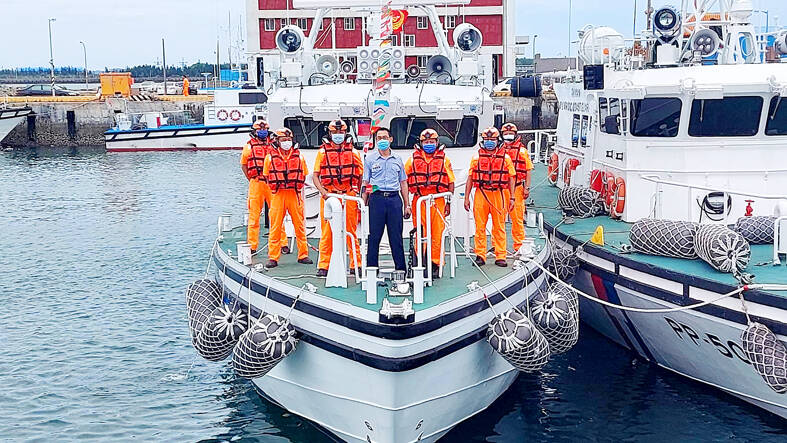The Executive Yuan on Thursday unveiled draft amendments to enable coast guard personnel to use weapons to defend themselves or others without firing warning shots.
The proposed amendments to the Act on the Use of Weapons and Requisite Instruments by the Coast Guard Authority (海岸巡防機關器械使用條例) are a major overhaul of the law, making 19 changes to its 17 articles, the Ocean Affairs Council (OAC) said.
The law, which has not been changed since its promulgation in 2003, contains outdated concepts regarding the use of force, it said.

Photo: Liu Yu-ching, Taipei Times
The bill would increase the flexibility of judgement of coast guard personnel by allowing them to use improvised instruments or methods in the discharge of their duties if issued weapons cannot be used effectively, the council said.
The amendments define the circumstances in which lethal force can be used without first firing warning shots so that coast guard personnel would be secure in their right to use force to defend themselves or others, it said.
An investigative unit would be created within the coast guard to conduct post-incident reviews after a shooting or other use of weapons to ensure that the application of force was justified, the council said.
Additionally, victims of improper use of force by the coast guard would be able to make a claim under the State Compensation Act (國家賠償法), moving civil liability from individual coast guard personnel to the government, it said.
The proposed amendments must be passed by the legislature before they take effect.
Separately, the Executive Yuan approved a draft amendment to the Marine Pollution Control Act (海洋污染防治法) to raise fines significantly for certain types of violations, if passed by the legislature.
The draft amendment proposed by the OAC would increase fines from between NT$300,000 and NT$1.5 million (US$9,851 and US$49,255) to between NT$1 million and NT$100 million for those illegally engaged in oil conveyance, marine construction projects, marine dumping or other activities that cause marine pollution.
The revisions also propose to increase fines for companies that receive government approval to engage in such activities, but fail to assist with an emergency pollution incident, from between NT$100,000 and NT$500,000 to between NT$500,000 and NT$50 million.
Additionally, the revisions would increase the maximum fine to NT$30 million from NT$1.5 million for those who contravene marine disposal procedures or licensing regulations, or who dump in marine zones other than those designated by the central government.
The proposed amendments would also place fines ranging from NT$30,000 to NT$30 million on those who use marine vessels to dump wastewater, waste, oil and other substances in the ocean.
The draft states that licensed marine dumpers, oil tanker transport services and importers of specified substances designated by the law, as well as operators of marine projects and marine facilities of a certain scale, would be charged marine pollution prevention and control fees that would go toward an ocean pollution prevention and control fund.
The draft also includes a clause for whistle-blowers to encourage the reporting of illegal activities, granting cash awards to thos who provide information that leads to a successful enforcement action.
The proposed amendments are to be sent to the Legislative Yuan for review, Executive Yuan spokesman Lo Ping-cheng (羅秉成) said.

An essay competition jointly organized by a local writing society and a publisher affiliated with the Chinese Communist Party (CCP) might have contravened the Act Governing Relations Between the People of the Taiwan Area and the Mainland Area (臺灣地區與大陸地區人民關係條例), the Mainland Affairs Council (MAC) said on Thursday. “In this case, the partner organization is clearly an agency under the CCP’s Fujian Provincial Committee,” MAC Deputy Minister and spokesperson Liang Wen-chieh (梁文傑) said at a news briefing in Taipei. “It also involves bringing Taiwanese students to China with all-expenses-paid arrangements to attend award ceremonies and camps,” Liang said. Those two “characteristics” are typically sufficient

A magnitude 5.9 earthquake that struck about 33km off the coast of Hualien City was the "main shock" in a series of quakes in the area, with aftershocks expected over the next three days, the Central Weather Administration (CWA) said yesterday. Prior to the magnitude 5.9 quake shaking most of Taiwan at 6:53pm yesterday, six other earthquakes stronger than a magnitude of 4, starting with a magnitude 5.5 quake at 6:09pm, occurred in the area. CWA Seismological Center Director Wu Chien-fu (吳健富) confirmed that the quakes were all part of the same series and that the magnitude 5.5 temblor was

The brilliant blue waters, thick foliage and bucolic atmosphere on this seemingly idyllic archipelago deep in the Pacific Ocean belie the key role it now plays in a titanic geopolitical struggle. Palau is again on the front line as China, and the US and its allies prepare their forces in an intensifying contest for control over the Asia-Pacific region. The democratic nation of just 17,000 people hosts US-controlled airstrips and soon-to-be-completed radar installations that the US military describes as “critical” to monitoring vast swathes of water and airspace. It is also a key piece of the second island chain, a string of

The Central Weather Administration has issued a heat alert for southeastern Taiwan, warning of temperatures as high as 36°C today, while alerting some coastal areas of strong winds later in the day. Kaohsiung’s Neimen District (內門) and Pingtung County’s Neipu Township (內埔) are under an orange heat alert, which warns of temperatures as high as 36°C for three consecutive days, the CWA said, citing southwest winds. The heat would also extend to Tainan’s Nansi (楠西) and Yujing (玉井) districts, as well as Pingtung’s Gaoshu (高樹), Yanpu (鹽埔) and Majia (瑪家) townships, it said, forecasting highs of up to 36°C in those areas